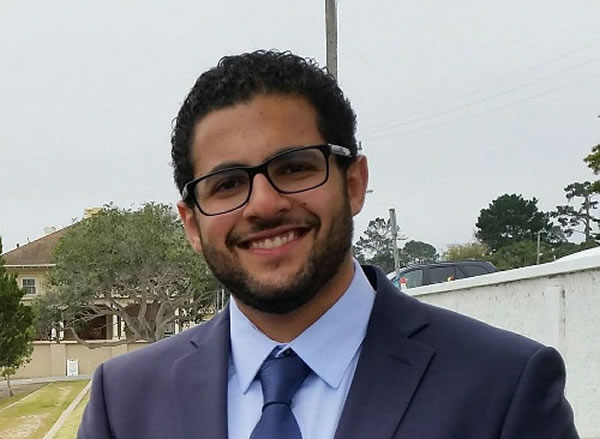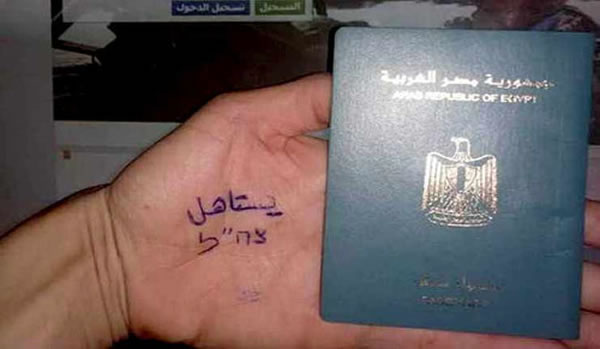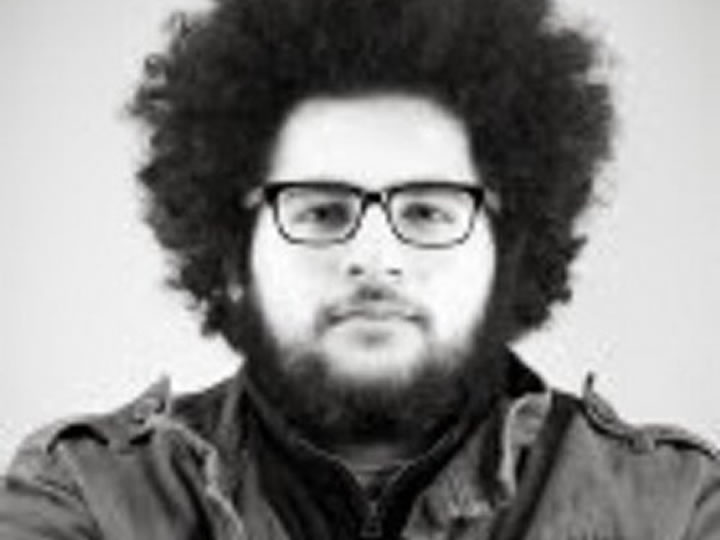Hussein Aboubakr Mansour, 27, was born to a Muslim banking family in Cairo, Egypt, and today is a self-proclaimed Zionist. He endured brutal torture in his homeland before coming to the United States on political asylum in 2012 and leaving behind everything he knew.
It all started when he was a young teenager, seeking more information about the supervillain he had grown up learning to hate: Jews.
Hussein’s family rejoiced at news of the attacks on the World Trade Center. In their view, the infidels were being punished.
“We all get handed the narrative of who we are. The narrative I received was that I was a member of the best country. Anything not the direct product of our culture was inferior,” Mansour explained to a rapt audience on a recent night at Congregation Beth Jacob in Atlanta at a lecture sponsored by StandWithUs. “The main enemies were the infidel West who want to take our resources.”
On 9/11, for example, his middle-class family rejoiced at news of the attacks on the World Trade Center and called their friends to turn on the TV. In their view, the infidels were being punished.
The main antagonist in this narrative was Israel. In order to understand the enemy and “decode Jews’ evil plans to ruin our country and our civilization,” Mansour, a nerdy kid with glasses, decided to learn Hebrew on the Internet. To do that, he had to first teach himself English. A funny thing happened along the way. The more he learned, the more he began questioning the narrative.
Firsthand accounts he read told a different story about Jews and their history. For example, he was shocked to find out Jews were indigenous to the Middle East. The story unfolding about a hated, persecuted minority that people were eager to murder at every occasion contrasted with the narrative of the demon super-Jew.
“The biggest shock was when I started to examine Israel as a culture from up close,” he relates. “In Israel there’s an accepted standard of human decency. To my surprise, I found Jews have a much higher standard of tolerance and don’t focus on killing Arabs the way Arabs focus on killing Jews. This huge moral gap opened my eyes.”

Driven by curiosity, Mansour found a resource in his own backyard: the Israeli Academic Center in Cairo – a product of the 1978 Camp David Accords between Israel and Egypt. There, Mansour had a chance to speak Hebrew with someone. He started with the first Jew he ever met: the security guard at the center.
Like a child in a candy store, the 19-year-old Egyptian devoured comic books and novels in Hebrew, all the while breaking a cultural taboo by visiting a place inhabited by Jews and Israelis.
As Mansour left the center, someone called his name. It was a state security officer. “Your professor should have told you all Egyptians are banned from this place,” the policeman said threateningly.
The following week, the Israeli diplomatic mission called to invite Mansour to watch a movie in Hebrew. Minutes later, another call came in to Mansour’s phone from a blocked number. It was a state security officer. “Why are Israelis calling your phone? You’re from a family of bankers. You should study banking.”
Although he wasn’t doing anything illegal, Mansour says, his phone was tapped. Still, he continued to study Hebrew and kindle his knack for languages.
Every time I wrote something state security didn’t like, they came to arrest me.
An Israeli newspaper interviewed him and state security again threatened him. His family did an intervention, and he promised to stop his studies of Hebrew, Israel and Judaism. But as a member of the Muslim majority in Egypt, he had had an awakening about the other side. He also started to notice how Christians in his country were persecuted, and their churches burned. He started a blog about anti-Semitism and treatment of Christians and Muslim women.

Eventually the family disowned him as an apostate. He fell out with religion because it seemed to him a tool for control.
“Every time I wrote something state security didn’t like, they came to arrest me. I promised to stop,” he says. “They put me in a military prison for two months and and tortured me, stripping me naked, hitting me with belts and calling me a Jew lover. There was no trial, judge or lawyer. It was the worst time of my life.”
On Dec. 26, 2010, they released him from prison. A month later, the revolution began that led to the ousting of Egypt’s president. Mansour felt hopeful. But then the Muslim Brotherhood came to power, attacks on minorities worsened, and he started getting arrested again for writing about his hopes for peace with Israelis.
“If I were in Israel I wouldn’t have been put in prison for sending an e-mail to the wrong person,” he told the audience. “It’s the only decent country in the Middle East that offers humans a life of respect and decency. It’s that moral gap that makes me support Israel.”

Mansour managed to obtain a visa for the United States and has lived in California since 2012. Today he devotes himself to teaching Hebrew, educating people about Israel and helping students fight anti-Semitism on college campuses through the pro-Israel organization StandWithUs.
Mansour wrote, “I was born an Arab; I know how violent, hateful, intolerant and aggressive Arabs are. So I support the right of the free people of Israel to have their own independent country. I support the civilized man against the savage, I support honesty over dishonesty, I support life over death, I support freedom against slavery, I support intelligence over stupidity, I support rationalism over terrorism. Thus, my dear reader, I support Israel.”
[Published on Aish.com, February 4, 2017]

